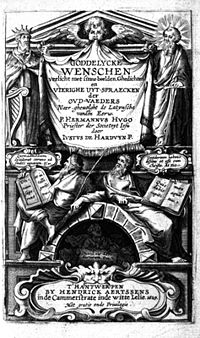Justus de Harduwijn
Justus de Harduwijn (born April 11, 1582 in Ghent , † June 21, 1636 in Oudegem near Dendermonde ) was a Dutch pastor . He is considered the most widely read poet of the 17th century and the Golden Age of the Netherlands .
life and work
Harduwijn was born in a politically troubled time. After his native city of Ghent fell to Philip II of Spain in the middle of the 16th century , the Protestant Ghentians rose up against the Catholics from Spain, who responded with a regime of terror. Harduwijn came from a respected, wealthy and strictly Catholic bookbinding family who remained loyal to Rome and supported the regime. His parents were François de Harduwijn († 1609) and Livina Tayaert, the father was a member of the Council of Flanders and ran a bookbindery in Ghent. In addition, his father was also a poet . He wrote verses in Latin and French and awakened a sense of language and literature in his son, just as he was influenced by his uncle, the humanist Maximiliaan de Vriendt († 1614), who also wrote Latin poetry.
Justus de Harduwijn was educated in what was then Ghent's elite college of the Jesuits and received lessons from Simon van de Kerckhove at his schola litteraria . Around 1600 he began studying theology and law at the University of Leuven and listened to Justus Lipsius . He was ordained a priest on April 11, 1607 in Ghent and subsequently worked as a pastor in the villages of Oudegem and Mespelaere in the diocese of Mechelen . His priestly work was unspectacular, nothing more is known about his daily life and his living conditions. Despite his aristocratic origins and his diverse contacts with contemporary personalities, he seems to have lived very withdrawn, the reasons for which are still speculated today.
In 1613 he published a collection of some very intimate love poems, which he had written as a student, under the title De weerliicke randen tot Roosemond . In order not to discredit the author, Guilliam Caudron (1607–1992) published the work anonymously. Today only one copy is known, which is kept under the registration number G 8342 in the University Library of Ghent.
In 1620 Goddelicke Lof-Sanghen and Val ende Opstand van David and Seven leed-tuygende Psalmen were published , in 1629 Harduwijn's main work Goddelycke wenschen , the first Dutch translation and adaptation of Herman Hugo's Pia desidera , the most famous meditation work in Latin of the 17th century.
Justus de Harduwijn's works were particularly successful in the northern Netherlands, the United Provinces . Although he was only 54 years old, he was one of the most widely read writers of the Dutch Golden Age and is still quoted by the Dutch population today.
Web links
- Emblem Project Utrecht with many illustrations
- Detailed biography of the Digital Library for the Netherlands at the University of Leiden (Dutch)
Individual evidence
- ↑ The name is spelled differently in the various sources - as is often the case when it comes to the historical written language. The phonetic variant Hardu wijn , consisting of three letters, is predominantly found in documents of the 17th century . Customary were Hard (e) wijn , Harduijn , Harduyn or latin: Hardewinus , Harduin (i) us' . There was also mostly disagreement about first names. So there was often a change between Dutch, French and Latin spellings and therefore Justus was also called Joos in Dutch .
- ↑ There is no doubt about his authorship, see dbnl.org
- ↑ See dbnl.org
| personal data | |
|---|---|
| SURNAME | Harduwijn, Justus de |
| BRIEF DESCRIPTION | Dutch pastor and poet |
| DATE OF BIRTH | April 11, 1582 |
| PLACE OF BIRTH | Ghent |
| DATE OF DEATH | June 21, 1636 |
| Place of death | Oudegem at Dendermonde |
